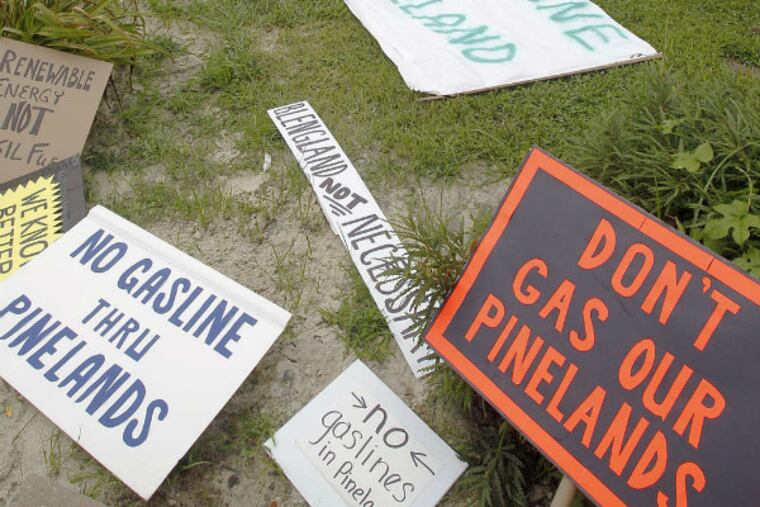Pipeline power play
When the Pinelands Commission holds its monthly meeting on April 10, it won't be the same panel that deadlocked in trying to decide whether to disregard its own rules so a natural-gas pipeline could be buried within the Pinelands National Reserve.

When the Pinelands Commission holds its monthly meeting on April 10, it won't be the same panel that deadlocked in trying to decide whether to disregard its own rules so a natural-gas pipeline could be buried within the Pinelands National Reserve.
Gov. Christie failed to get the old commission to ignore the Pinelands Comprehensive Management Plan, which would permit a pipeline within the forest management area only if it is "intended to primarily serve the needs of the Pinelands." So he stacked the deck by refusing to reappoint two commission members who did not vote for the pipeline once their terms expired.
The governor's move apparently paid off two weeks ago with the state Senate's confirmation of Robert Barr to replace commission Chairman Robert Jackson, who opposed the pipeline. Barr would not discuss the pipeline in confirmation hearings other than to say he would study the issue, but he is a close associate of Sen. Jeff Van Drew (D., Cape May), who supports the pipeline.
Barr's appointment came after Senate President Steve Sweeney (D., Gloucester) rammed it through at the expense of his credibility with environmentalists. Twice the Senate Judiciary Committee turned down Barr. But during a third meeting in February, Sweeney took advantage of the absence of Sen. Raymond Lesniak (D., Union), a pipeline foe, to appoint Van Drew as a temporary substitute and get the votes he needed for Barr.
"I'm not against the Pinelands," Sweeney later told the Asbury Park Press. "I want to save the jobs." He said there are already six gas transmission line segments in portions of the Pinelands, varying from four to seven miles in length. The senator also contended that the South Jersey Gas application for the new pipeline is filled with environmental standards the company must meet.
In January, the pipeline failed to pass the commission on a 7-7 vote, with one recusal. If Christie's new Pinelands Commission ignores its own management plan and allows the pipeline, expect developers to argue for similar exceptions. That slippery slope could lead to one of the nation's few pristine forests becoming ground zero for more sprawling exurbs, threatening a precious water supply.
The Pinelands is a 1.1 million-acre forest that includes the shallow Kirkwood-Cohansey aquifer system, which provides drinking water for 17 million people and serves as habitat for numerous endangered plants and animals. Development not just within but too close to this sensitive ecosystem could spoil the delicate balance that keeps the water clean.
The proposed gas pipeline would keep alive the old B.L. England oil and coal power plant, which was set to be decommissioned because it spews too much carbon into the air. The political pollution that has fouled the State House in Christie and Sweeney's determination to get the Pinelands Commission to do their bidding may be just as toxic to New Jersey.
Sen. Loretta Weinberg (D., Bergen) warns that other independent commissions must fear the same fate if they don't bow when the governor barks a command. She's right.